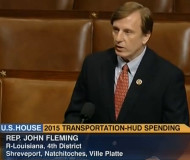Article from: www.thenewspaper.com/news/44/4437.asp
6/16/2014
US House Approves Ban On Federal Traffic Camera Funding
License plate readers and photo enforcement cameras will not receive federal funding under House-passed legislation.
 The US House of Representatives voted 255 to 172 last Tuesday in favor of a ban on federal funding of red light cameras, speed cameras and automated license plate readers (ALPR or ANPR). Representative John Fleming (R-Louisiana) proposed the measure as an amendment to the Transportation, Housing and Urban Development appropriations bill which has yet to be taken up by the Senate.
The US House of Representatives voted 255 to 172 last Tuesday in favor of a ban on federal funding of red light cameras, speed cameras and automated license plate readers (ALPR or ANPR). Representative John Fleming (R-Louisiana) proposed the measure as an amendment to the Transportation, Housing and Urban Development appropriations bill which has yet to be taken up by the Senate.
"None of the funds made available by this act may be used to acquire a camera for the purpose of collecting or storing vehicle license plate numbers," the House-passed language states.
In recent years, the federal government has been offering millions of dollars in grants to towns small and large, encouraging police agencies to install license plate reading cameras. Federal agencies a decade ago provided $70,000 to $100,000 in seed money to several cities to promote red light camera, including Beaverton, Oregon; Decatur, Georgia; Howard County, Maryland; Lakewood, Washington; and Washington, DC. These programs turned the seed money into millions in profit, according to an audit by the Government Accounting Office (view report).
Another GAO report found the federal government spent $51 million on photo ticketing, facial recognition and related surveillance camera technologies through the year 2001 (view report). By 2012, Congress decided to put a stop to it and specifically banned federal funding for red light cameras. Fleming decided to increase the scope of the ban in light of how the National Security Agency has been spying on Americans who are not suspected of any wrongdoing.
"Just like phone metadata, this geo-location data with time stamps can be used to reconstruct intimate details of our lives, who we visit, where we worship, from whom we seek counseling, and how we might legally and legitimately protest the actions of our own government," Fleming explained. "This language expands upon the prohibitions already adopted under previous MAP-21 reauthorizations preventing federal funds from being used to purchase cameras for purposes of traffic law enforcement. Despite this prohibition, transportation grants can still currently be used to purchase cameras that collect and store license plate data even when no crime has been committed."
Representative Tom Latham (R-Iowa) opposed the language on the grounds that it would interfere with revenue raising operations.
"The prohibition could undermine revenue collection systems on several large toll-funded routes who take pictures of a license plate -- and that is how they charge -- and put federal loans at risk of default not having that means of collecting those revenues," Latham said.
For the ban to become law, the language must be passed in the Senate and signed by the president. In the past several years, however, the transportation language has not been adopted as a free-standing measure. Instead, the language will most likely be rolled into an end-of-year "omnibus" spending bill. The ban applies to funding that comes through the Department of Transportation and lasts through the appropriations cycle until renewed.
 The US House of Representatives voted 255 to 172 last Tuesday in favor of a ban on federal funding of red light cameras, speed cameras and automated license plate readers (ALPR or ANPR). Representative John Fleming (R-Louisiana) proposed the measure as an amendment to the Transportation, Housing and Urban Development appropriations bill which has yet to be taken up by the Senate.
The US House of Representatives voted 255 to 172 last Tuesday in favor of a ban on federal funding of red light cameras, speed cameras and automated license plate readers (ALPR or ANPR). Representative John Fleming (R-Louisiana) proposed the measure as an amendment to the Transportation, Housing and Urban Development appropriations bill which has yet to be taken up by the Senate.